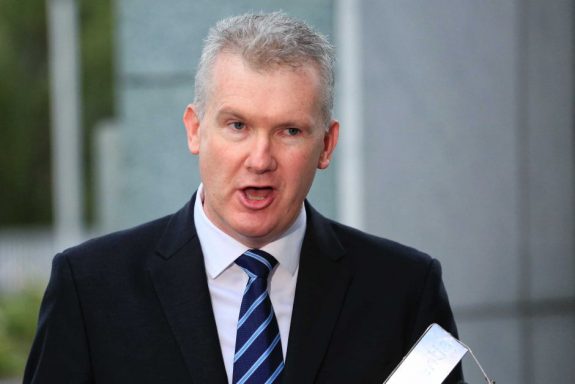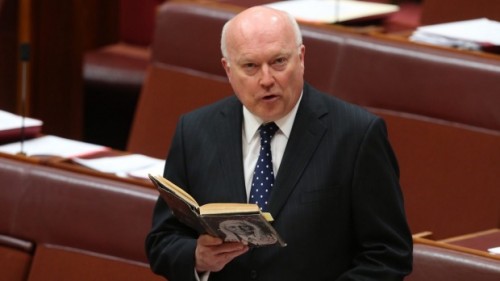Porter’s bills may sink BOOT into penalty rates, warns Burke

Shadow industrial relations minister Tony Burke has warned that Australian workers may lose their penalty rates by the end of January 2022 – not via targeted cuts, but through knock-on effects previously outlined in Attorney-General Christian Porter’s industrial relations reform bills.
In contrast to the planned penalty rate cuts the Turnbull and Morrison governments executed in a three-year interval from 2017 to 2019, workers may see their wages drop markedly across four major summer-based public holidays if the Better Off Overall Test (BOOT) results in being revamped upon passage of Porter’s proposed legislation of two bills on industrial relations reforms.
Successful passage of Porter’s legislation, crafted and presented in federal Parliament’s final sitting week of 2020 last month when representatives between union leaders and the business lobby failed to previously come to an agreement on areas of reform, could even see the BOOT halted for any length of time.
“Australian workers could lose between $840 and $1170 from their pay packets next summer holidays if Scott Morrison gets his way and public holiday penalty rates are scrapped,” Burke said on Thursday.
The BOOT – according to the Fair Work Commission – in considering labour and remuneration terms which may be more or less beneficial overall to employees in an individual agreement versus that of a Modern Award for a particular industry, views an overall assessment being made as to whether employees would be better off under the agreement than under the relevant award.
Instead, under Porter’s scheme of industrial relations reform measures, the BOOT could be suspended in particular situations as deemed practical by the FWC, thereby leading to workers’ wages potentially being lost during the summer holidays.
“The Government recognises the BOOT’s importance as a key safeguard for workers,” Porter said last month in promoting his reform bills.
“Given that many industries are still reeling from the impacts of the pandemic, it also makes good sense for the FWC to be able to consider agreements that don’t meet the BOOT if there is genuine agreement between all parties, and where doing so would be in the public interest,” he added.
In a retaliatory blow aimed against Porter’s bills, Burke has taken the difference between the base and public holiday pay rates of typical award workers who work standard eight-hour days across Christmas Day, Boxing Day, New Year’s Day and Australia Day – four public holidays over a month’s span.
Moreover, Burke has compiled a list of figures taken from the government’s own fair pay calculator to arrive at his conclusions.
“Millions of workers across the economy are vulnerable to attack under Mr Morrison’s nasty industrial relations changes,” said Burke.
And by Burke’s figures, no one industry will be immune to the changes, provided that the reform bills are approved.
“From cleaners to miners, aged care workers to waiters, checkout operators to nurses – all could take a massive pay cut if Mr Morrison is successful in suspending the Better Off Overall Test,” he said.
The list of which workers in each industry could stand to lose the greatest amounts of their wages per December and January public holiday:
- In aged care – $270
- Banking, finance, or insurance (Level 3) – $293
- Cleaners (Level 2) – $263
- Junior fast food worker – $227
- Retail – $220
- Underground miners – $287
- Hair salon attendants and/or beauticians – $272
- Registered nurses (Level 5) – $223
- Hospitality (Level 2) – $210
- Restaurant waiters – $215
Burke also added that in the other 48 or so weeks of the year, suspension or bypassing the BOOT could potentially see workers losing their weekend, early morning and late-night shift penalty rates as well as those for public holidays.
“If you abolish something called the Better Off Overall Test, guess what will happen: workers will be worse off,” said Burke.
Porter claims that, in a summary of his authored reforms, a re-establishment of enterprise bargaining via a 21-day approval deadline will drive wage growth and gains in productivity, even at the expense of the BOOT on a case-by-case basis.
And if it runs side-by-side with other areas of the proposed legislation, particularly, a simplification of awards in what Porter has specified as the retail and hospitality sectors, it may have the reverse effect.
The union movement remains understandably livid over the possibility of penalty rates being collateral damage in any applications of industrial relations reform.
“When WorkChoices was introduced, employers rushed out to cut wages — the same will happen if this law passes,” Sally McManus, the national secretary of the Australian Council of Trade Unions (ACTU), said last month in response to Porter’s industrial relations reform bills.
“We believe this is the wrong thing for the country.
“We should be protecting working people at this time in order to grow the economy; you can’t go about hurting working people — that’s exactly the opposite to what you should be doing,” McManus added.
Burke also pointed out that the intentional cuts to penalty rates failed to create a single job, despite government promises to the contrary when the proposals were first floated.
“But now they want us to believe that cutting more penalty rates, cutting overtime, cutting shift loading, cutting allowances will create jobs?” Burke said.
Burke feels that Porter’s industrial relations bills should be doomed to fail – and the Morrison government is lacking priorities to growing the national economy out of recession.
“Pay cuts are bad for workers and bad for the economy. For Australia to recover from the recession we need people with the money and confidence to spend,” said Burke.
“The government says the economy is doing well enough that businesses no longer need JobKeeper. But then they say the economy is doing so badly they need to cut the pay of workers.
“They can’t have it both ways,” added Burke.
Also by William Olson:
Corruption viewed within fine print of super reforms
Now is not the time for subsidy cuts, says ACTU
Qantas workers cannot be denied sick leave, says ACTU
MYEFO missing points on long-term recovery: ACTU
[textblock style="7"]
Like what we do at The AIMN?
You’ll like it even more knowing that your donation will help us to keep up the good fight.
Chuck in a few bucks and see just how far it goes!
Your contribution to help with the running costs of this site will be gratefully accepted.
You can donate through PayPal or credit card via the button below, or donate via bank transfer: BSB: 062500; A/c no: 10495969











